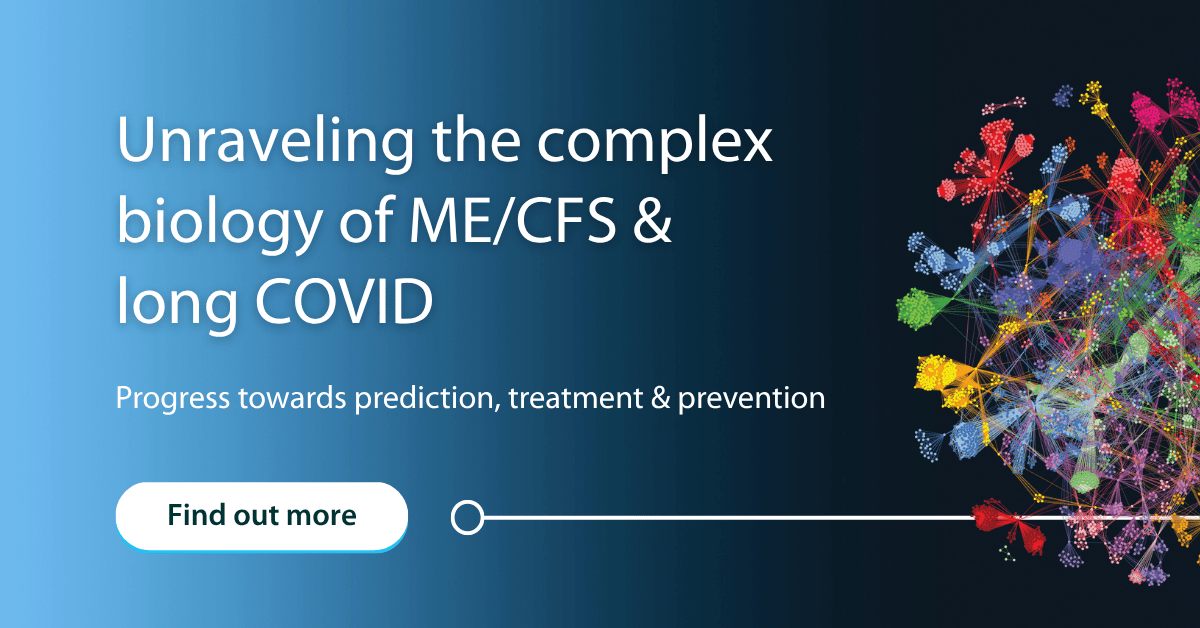Why Your Biology Matters: Progress Towards Personalized Care for ME/CFS and Long COVID
Understanding the biology behind long COVID and ME/CFS is essential if we want to move beyond trial-and-error approaches to diagnosis and treatment. In this blog, we share how new research is uncovering the genetic mechanisms driving these conditions – and how that knowledge is shaping the development of more precise and personalized care.
What makes long COVID and ME/CFS so difficult to diagnose and treat?
 We now know that long COVID and ME/CFS are both very complex diseases with multiple symptoms affecting different organs.1,2,3 It’s not a simple case of there being one or two genes causing either disease.
We now know that long COVID and ME/CFS are both very complex diseases with multiple symptoms affecting different organs.1,2,3 It’s not a simple case of there being one or two genes causing either disease.
There are whole mechanisms (pathways of several genes working together) that can be affected. Mechanisms might include reduced mitochondrial function causing post-exertional malaise (PEM) and fatigue, the failure of production of neurotransmitters causing brain fog, or disrupted circadian rhythm affecting sleep and immune function.
Different patients can present with different sets of symptoms because their form of the disease is driven by one or more of these different genetic mechanisms, and also because they may have a different immunological response to the initial viral infection.
The lack of understanding of the biological basis of the diseases has hampered development of accurate diagnostics and effective drug therapies. New drug discovery and even drug repurposing efforts rely on knowing which gene or mechanism in the body is causing disease and showing that a drug that targets this gene or mechanism can correct these effects.
Why many drug trials fail – and how we can improve them
Unfortunately, the variation in causes of disease between patients means that even if we have a drug that appears to work in one person, it may not work, or may be actively harmful, in another person. We’ve seen this in the TREATME, DecodeME and BC 007 studies.
If in a clinical trial relatively few of the patients tested actually benefit from a drug (as happened with BC 007), the trial will fail, even though the drug works well in some of the patients.
However, if we can identify beforehand the patients who are most likely to benefit from the drug and specifically recruit just them for the clinical trial, we have a much higher chance of success and getting a drug that works (even for a subset of patients) to the clinic.
It’s therefore critical to know what’s driving disease in each individual patient and select the appropriate therapies that are most likely to work for them.
This is the precision medicine approach that we’re working to validate in clinical research studies such as MELO.
What the research is telling us so far
In our research we’ve identified (and validated) 14 genes associated with ME/CFS and 73 associated with long COVID.
Crucially, we’ve shown a significant overlap between the diseases’ genes and mechanisms – the diseases are distinct but share some common features.
This all offers significant hope for better diagnostic tools, and new treatment options that may benefit both diseases, which we're currently working on – starting with a new form of precision medicine test.
The new test – and what it could mean for patients
We’ve now developed a simple, non-invasive cheek swab test (which we call a Mechanostic® test) that can quickly identify which genes might be contributing to a patient’s disease.
We have initial evidence that this test can successfully predict the symptoms an individual is likely to report, and we now hope to prove that this can also tell us which medicines they are most likely to benefit from.
What happens next?
We’re at an important stage of the research, having received data from hundreds of participants who have taken our mechanostic tests for long COVID and ME/CFS.
While the data collected from research studies like MELO is currently intended for research use only purposes, it can also help support the next phase of development.
We’re aiming to use the data from research studies to move to full validation of the clinical applications of the test as quickly as possible – developing an accurate and well-accepted test for the diseases, to predict risk of long COVID and ME/CFS, identify the underlying causes of a patient’s disease, and, in the fullness of time, to help clinicians select between different therapies and treatment approaches to find the optimum combination for improving the health of individual patients.
Why participation is key
Clinical research studies like MELO help us to improve our understanding of the accuracy of the test and prove its benefits to regulators. They also help us to shape the reporting of results to be as useful as possible for clinicians and patients, to design new drug repurposing clinical trials whose patient recruitment is targeted to specific mechanism/s and give us the best chance to impact patients’ lives positively in the near future.
We can’t make this progress without the participation of patients, and we are deeply grateful for the engagement and trust shown by our long COVID and ME/CFS participants in MELO and other studies.
A shared commitment to progress
The advances we are making through MELO are strengthened by strong collaboration with partners who are equally committed to transforming the landscape for complex post-viral diseases.
Complex Disorders Alliance (CODA), is an innovative non-profit research foundation who helped to support MELO. CODA brings a mission centered on driving high impact science for long COVID, ME/CFS and related neuroimmune conditions. CODA’s investment and unwavering focus on the patient community help make it possible to move mechanistic findings into real world solutions sooner and with deeper impact on care.
ChronicleBio is a biotech company focused on neuroimmune disorders like ME/CFS, Long COVID, and POTS. ChronicleBio combines patient-contributed data with advanced AI to uncover the biological drivers of complex chronic conditions and accelerate research that leads to answers, diagnostics, and future treatments.
Together, we are building the scientific foundation needed to deliver better diagnostics, smarter trials and more effective therapies for the people who need them most.
[1] Das, S., Taylor, K., Kozubek, J. et al. Genetic risk factors for ME/CFS identified using combinatorial analysis. J Transl Med 20, 598 (2022). https://doi.org/10.1186/s12967-022-03815-8
[2] Taylor, K., Pearson, M., Das, S. et al. Genetic risk factors for severe and fatigue dominant long COVID and commonalities with ME/CFS identified by combinatorial analysis. J Transl Med 21, 775 (2023). https://doi.org/10.1186/s12967-023-04588-4
[3] Sardell, J., Pearson, M., Chocian, K. et al. Reproducibility of genetic risk factors identified for long COVID using combinatorial analysis across US and UK patient cohorts with diverse ancestries. J Transl Med 23, 516 (2025). https://doi.org/10.1186/s12967-025-06535-x
Sign Up



